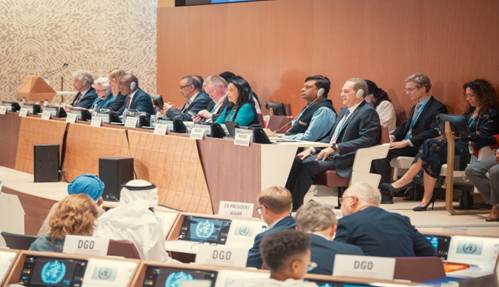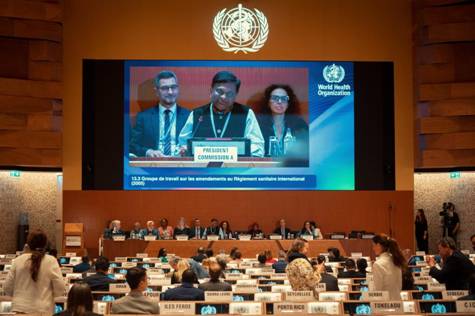
Geneva: In a landmark achievement in the global health security agenda, the 77th World Health Assembly (WHA) agreed to the package of amendments to the International Health Regulations (IHR 2005) based on 300 proposals made by member countries after the COVID-19 pandemic.
“Your adoption of the Fourteenth General Programme of Work charts a course for global health for the next four years, with a commitment to promote, provide and protect the health of the world’s people. The package of amendments to the International Health Regulations that you adopted is a historic achievement that makes the world a safer place; And you have agreed on a path forward for the Pandemic Agreement, and I remain confident that you will bring it to a conclusion,” Dr Tedros Adhanom Ghebreyesus, Director-General, World Health Organization told the Assembly.
The 77th WHA also adopted decisions and resolutions on many key health issues: Antimicrobial resistance; climate change and health; infection prevention and control; maternal, newborn and child health; mental health in emergencies; social participation in primary health care; transplantation, and more. It also launched the WHO Investment Round.
The new amendments to the IHR include:
- Introducing a definition of a pandemic emergency to trigger more effective international collaboration in response to events that are at risk of becoming, or have become a pandemic. The pandemic emergency definition represents a higher level of alarm that builds on the existing mechanisms of the IHR, including the determination of public health emergency of international concern. According to the definition, a pandemic emergency is a communicable disease that has, or is at high risk of having, wide geographical spread to and within multiple States, exceeds or is at high risk of exceeding the capacity of health systems to respond in those States; causes, or is at high risk of causing, substantial social and/or economic disruption, including disruption to international traffic and trade; and requires rapid, equitable and enhanced coordinated international action, with whole-of-government and whole-of-society approaches;
- A commitment to solidarity and equity in strengthening access to medical products and financing. This includes establishing a Coordinating Financial Mechanism to support the identification of, and access to, financing required to “equitably address the needs and priorities of developing countries, including for developing, strengthening and maintaining core capacities,” and other pandemic emergency prevention, preparedness and response-related capacities;
- Establishment of the States Parties Committee to facilitate the effective implementation of the amended Regulations. The Committee will promote and support cooperation among States Parties for the effective implementation of the IHR; and
- Creation of National IHR Authorities to improve coordination of implementation of the Regulations within and among countries.
The targeted amendments to the International Health Regulations (IHR) aim at improving countries’ ability to prepare for and respond to Public Health Emergencies of International Concern (PHEIC) and Pandemic Emergencies (PE). They include provisions for facilitating equitable access to relevant health products during PHEIC and PE, as well as mobilizing financial resources to support developing countries in building, strengthening, and maintaining the core capacities required under the IHR (2005).
Apurva Chandra, Secretary of the Union Ministry of Health and Family Welfare of India stated that “with the revision of the International Health Regulations, an incredible milestone has been reached.” He also said that “this is a further step towards equity and the creation of an umbrella of solidarity that will help protect the world from future pandemic threats. This is a gift to our children and grandchildren.”
Chandra, the Chair of Committee A of the 77th World Health Assembly, delivered the concluding remarks to the plenary, in Geneva yesterday. Presenting his report on the work of Committee A over the last 6 days, he highlighted the intense agenda with rich discussions in the assembly which culminated in decisions that will shape the future of global health. He stated that Committee A tackled the Fourteenth General Programme of Work, 2025–2028, the first in this new post-COVID era, setting a robust health agenda for the next four years.
The Working Group on International Health Regulations (WGIHR) and Intergovernmental Negotiating Body on Pandemic treaty with country representations began the negotiation process in two separate groups almost two years ago and met several times including many resumed sessions on the issue. The processes witnessed many close calls with seeming deadlocks over positions taken by the various stakeholders.
To finalize the package of amendments to IHR, a proposal was put forward in the form of a White Paper by Apurva Chandra as the Chair of Committee A of the World Health Assembly on May 28, 2024. It proposed to establish a single drafting group, to be co-chaired by one Bureau member from the Intergovernmental Negotiating Body (INB) and the Working Group on Amendments to the International Health Regulations (2005) (WGIHR) respectively, to consider the matters related to some of the most critical agenda items – the proposed amendments to the IHR (2005), followed by consideration of procedural matters on way forward related to INB negotiations on the Pandemic treaty. All member states approved the said proposal by consensus.
The single drafting group thus established, along with the WHO secretariat and Member State representatives, through sheer hard work and determination completed the work of bringing consensus in the ongoing IHR amendments during the 77th assembly session period. India played a constructive role in crafting the Instrument, which seeks to operationalize equity, necessary for an equitable response by developing countries to Public Health Emergencies.
As a result, on28th June 1, 2024, the Resolution to the amendment of IHR (2005) was adopted by consensus in the 77th World Health Assembly.
– global bihari bureau





